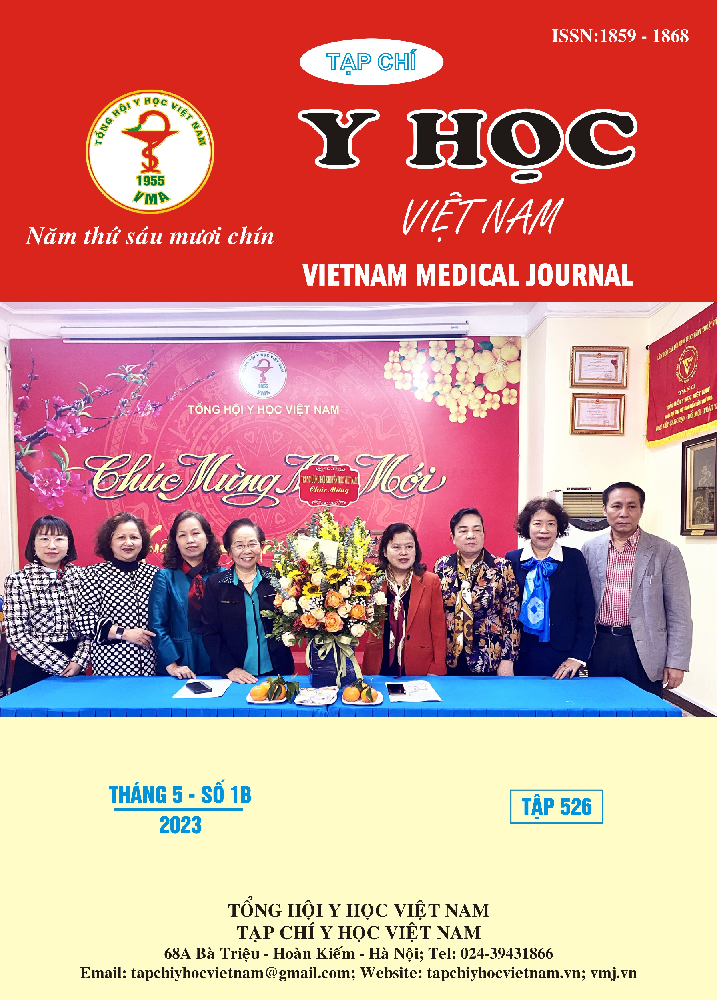OUTCOMES OF CORTICOSTEROID TREATMENT IN ANTI-NMDAR ENCEPHALITIS AT THE NEUROLOGY CENTER OF BACH MAI HOSPITAL
Main Article Content
Abstract
Objective: To assess the outcomes of corticosteroid treatment in autoimmune encephalitis with N-methyl-D-aspartate receptor antibodies (anti-NMDAR encephalitis). Subjects: 40 patients diagnosed and treated for anti-NMDAR encephalitis between 01/2020 and 11/2022 at the Neurology Center of Bach Mai Hospital. Methods: Cross-sectional descriptive study. In this study, patients with anti-NMDAR encephalitis were initially treated with corticosteroid monotherapy followed by combination with plasma exchange and/or second-line immunotherapy consisting of rituximab or cyclophosphamide in case of non-response to corticosteroid treatment. Patients with a modified Rankin Scale (mRS) score of ≤ 2 at discharge were classified as good treatment outcome, and patients with a modified Rankin Scale (mRS) score of > 2 at discharge were classified as poor treatment outcome. We then evaluated the result of corticosteroid therapy. Results: Among the 40 study patients, we observed that the majority of patients were female (72.5%), with a male-to-female ratio of 1/2.64 and a mean age of 33.25 ± 15.01 years. All patients received immunotherapy, with 16 patients (40%) receiving corticosteroid monotherapy and 24 patients (60%) receiving corticosteroid in combination with other immunotherapies. The treatment outcomes at discharge were equivalent, with 19 patients (47.5%) having good outcomes and 21 patients (52.5%) having poor outcomes. 87.5% of patients who showed a good response to corticosteroid monotherapy achieved good treatment outcome while only 20.8% of patients who failed to respond to corticosteroid monotherapy acquired similar result. Of the 16 patients treated with corticosteroid monotherapy, 11 were female (68.75%) and 5 were male (31.25%). The rate of good and poor treatment outcomes in the female group was 90.9% and 9.1%, respectively, while in the male group it was 60% and 40%, with no significant difference in the treatment outcomes between males and females in the corticosteroid monotherapy group (p-value = 0.214). Conclusion: Out of 40 patients in this cross-sectional descriptive study, 47.5% achieved a favorable treatment outcome while 52.5% did not. Good treatment outcome was acquired by 87.5% of patients who responded well to corticosteroid monotherapy and only 20.8% of patients who were not responded to corticosteroid monotherapy.
Article Details
Keywords
Autoimmune Encephalitis, Anti N-methyl-D-Aspartate receptor, NMDA
References
2. Dalmau J, Gleichman AJ, Hughes EG, et al. Anti-NMDA-receptor encephalitis: case series and analysis of the effects of antibodies. The Lancet Neurology. 2008;7(12):1091-1098. doi:10.1016/s1474-4422(08)70224-2
3. Abboud H, Probasco JC, Irani S, et al. Autoimmune encephalitis: proposed best practice recommendations for diagnosis and acute management. J Neurol Neurosurg Psychiatry. Jul 2021;92(7):757-768. doi:10.1136/jnnp-2020-325300
4. Titulaer MJ, McCracken L, Gabilondo I, et al. Treatment and prognostic factors for long-term outcome in patients with anti-NMDA receptor encephalitis: an observational cohort study. The Lancet Neurology. 2013;12(2):157-165. doi:10.1016/s1474-4422(12)70310-1
5. Mo Y, Wang L, Zhu L, et al. Analysis of Risk Factors for a Poor Prognosis in Patients with Anti-N-Methyl-D-Aspartate Receptor Encephalitis and Construction of a Prognostic Composite Score. J Clin Neurol. Jul 2020;16(3):438-447. doi:10.3988/jcn.2020.16.3.438
6. Wang Y, Zhang W, Yin J, et al. Anti-N-methyl-d-aspartate receptor encephalitis in children of Central South China: Clinical features, treatment, influencing factors, and outcomes. J Neuroimmunol. Nov 15 2017;312:59-65. doi:10.1016/j.jneuroim.2017.09.005


